2011 年云南昆明理工大学单考英语考研真题 A 卷
Part I
Vocabulary and structure
(20%)
Directions: In this section, there are 40 sentences. For each sentence there are
four choices marked A), B), C) and D). Choose one of the words which is
closestinmeaningtotheunderlinedwordortocompletethesentenceand
markyouranswerontheanswersheetwithasinglelinethroughthecenter.
1. The plans for the new office and apartment building were
a few weeks ago.
A. drawn to
B. drawn out
C. drawn up
D. drawn in
2. I don’t really know David all that well. He’s just a(n)
acquaintance
of mine.
A. accidental
B. random
C. hazardous
D. casual
3. Fortunately when I collided with that big car, the damage to both cars was
only
.
A. small
B. minimal
C. little
D. few
4. It’s surprising how few students can
between oranges and tangerines.
A. choose
B. see
C. distinguish
D. separate
5. Your appointment will take
from lst July.
A. action
B. hold
C. effect
D. place
6. From
of the negotiations, it was clear that it would be hard for the
two sides to reach an agreement.
A. outbreak
B. outlook
C. outset
D. onset
7. My daughter was so
in the TV program that she forgot to turn the microwave
oven off.
A. distracted
B. attracted
C. enchanted
D. engrossed
8. Tourists are
to beware of pickpockets in the bus.
A. commanded
B. notified
C. informed
D. advised
9. Susan is a devoted daughter, always very
to the needs of her old parents.
A. attentive
B. observant
C. recurrent
D. earnest
10. These mountaineers will have to
severe cold and terrible winds.
A. survive
B. endure
C. attain
D. go through
�
11. Josh found that the evening was beginning to
after his mother made
efforts to forbid him to watch television.
A. extend
B. prolong
C. drag
D. delay
12. The dreadful scenes of the major skirmish
the children off their dinner.
A. took
B. put
C. sent
D. set
13. His argument
that people still regard television as a favorable,
beneficial, wondrous influence upon the family but this is no longer the case.
A. presents
B. offers
C. concerns
D. presupposes
14. The purpose of the survey was to
the parents with the changes
television has made in family life.
A. acquaint
B. inform
C. tell
D. notify
15. We are of the opinion that standards of craftsmanship have been
over the
past ten years.
A. lifted
B. heightened
C. raised
D. uplifted
16. The zoo attendant opened the cage and tried hard to
the tigers back in.
A. pacify
B. reassure
C. induce
D. coax
17. The unfair criticism left Norman quite
with anger.
A. spellbound
B. speechless
C. silent
D. mute
18. In a television-oriented family, children cannot expect to have much time to
_________to games, familiar songs and shared activities.
A. devote
B. concentrate
C. spare
D. spend
19. We are not sure why she didn’t go into the advanced class, but we
she
failed the English Proficiency Test.
A. predict
B. deduce
C. induce
D. suspect
20. By the end of the month our only hopes of success
in recruiting more
extra help.
A. lay
B. consist
C. stood
D. arose
21. It is not profitable to provide bus services in districts where the population
is widely
.
A. spaced
B. divided
C. separated
D. scattered
�
22. Sand is to glass as clay is to
.
A. stone
B. hay
C. bricks
D. dirt
23. His test results for the whole term were not very
. He did well one week
and badly the next.
A. consequent
B. continuous
C. consistent
D. invariable
24 The novelist is a highly
person with great talent.
A. imaginative
B. imaginable
C. imaginary
D. imaging
25. Mary is so
that she cried for days when her pet died.
A. sensitive
B. sensible
C. impressive
D. sentimental
26. The rainbow
as the sun came fully out from behind the clouds.
A. dissipated
B. removed
C. dispersed
D. dissolved
27. Now Norman has put himself into the patient
state of mind of a chess
player.
A. contemplative
B. attentive
C. pondering
D. thinking
28. It’s a good thing to spend some time seeing your own country from the outside:
it helps you to get a sense of
.
A. ratio
B. proportion
C. symmetry
D. relation
29. Mary gave a long and stagy laugh, wiping away
tears.
A. imaginative
B. imaginable
C. imaginary
D. imaging
30. In my younger and more
years my father gave me some advice that I’
ve been turning over in my mind ever since.
A. pregnable
B. frail
C. assailable
D. vulnerable
31. The issue Frank is discussing concerns everyone who flouts basic rules of the
road.
A. subject
B. book
C. article
D. equation
32. The evaluation stated that the police commissioner’s work has been satisfactory.
A. content
B. competent
C. sufficient
D. adequate
33. After a short break, the lecture on the hazards of lawbreaking resumed.
A. continued
B. returned
C. repeated
D. concluded
34. The Administration in Washington took it for granted that we would agree.
�
A. imagined
B. judged
C. suspected
D. assumed
35. Because Mary felt humiliated at being fined for ignoring the federal 55 m. p.
h. speed limit, she would not come to the lecture on the dangers of scoff-lawry.
A. disappointed
B. ashamed
C. disgusted
D. unhappy
36. Believe it or not, a novel with a good plot but with a pedestrian style of writing
will not become a best seller.
A. mediocre
B. newsworthy
C. dull
D. public
37. Their inept handling of our account about the law-breakers made us reevaluate
our relationship with them.
A. clumsy
B. inappropriate
C. silly
D. inferior
38. The article alluded to the car crashes on the interstate highways, caused by
the lawless activities of the American driver.
A. deluded
B. spoke of
C. referred to
D. recounted
39. The sociologist’s intransigent manner in no way helped her get her way.
A. honest
B. friendly
C. loud
D. stubborn
40. Drunken driving is a major catastrophe in which a great many lives have been
lost.
A. casualty
B. disaster
C. change
D. threat
Part II
Reading Comprehension
(40%)
Directions: In this section there are 4 passages. Each passage is followed by 5
questions or unfinished sentences. For each of them there are 4 choices
marked A, B, C and D Choose the best answer and mark your choice on the
ANSWER SHEET with a single line through the center.
Passage 1
Many historians of the twentieth century look back at the fifteenth century
and say, "Maehiavelli was the first political scientist in history. They say that
he looked at politics for the first time with the factual eye of a scientist. He
was only interested in the facts. He thought that politics and morality didn't go
together very often, but he studied ideas of right and wrong, along with politics;
government leaders, he wrote, could use these ideas to get and keep power.
In Maehiavelli's opinion, the nature of human beings is usually evil, so a good
�
person must always fail. He thought it was important for a political leader to know
how to be bad. In fact, Maehiavelli saw leaders of government as people above
ordinary human beings; so he believed they are also above ordinary morality. Good
and evil, he said, are only ideas that weak people use to excuse weakness; powerful
people use these ideas to keep other people weak. They can lead because they want
power and because they fight for it. Also these leaders are not usually afraid to
leave morality behind, so they don't have ideas of right or wrong to stop them.
They think only of power. It is nice, Maehiavelli said, if political leaders can
also be good people, but they must know how to be bad when the time comes.
Maehiavelli said that it is natural to fight for power and that there are two
methods people use: law and physical force. The first method is the way of human
beings. They do this to get and keep power.
People are evil, in Maehiavelli's opinion, so war and fighting are always in the
world; they are a natural part of it. Political leaders know the way of nature,
of people, and animals, and they use their knowledge to get what they want.
41.According
to
the
passage,
a
political
scientist
is
a
person
who_________________..
A. studies politics and science at the same time
B. studies science in a political way
C. knows politics as well as science
D. studies politics in a scientific way
42. According to the passage, what does Maehaivelli think of the ideas of right
and wrong ?
A. There is nothing absolutely right or wrong.
B. Political leaders know the ideas of right and wrong and use them to stop
themselves from doing sth. wrong.
C. Weak people use the ideas to keep inward peace
D. Compared with power, ideas of right and wrong are nothing to political
leaders.
43. Which of the following can be included into the opinion of Maehiavevelli?
A. Political leaders are special human beings and have different morality
B. Human beings are usually bad and are certain to fail.
�
C Powerful people use ideas of right and wrong to control themselves.
D. Political leaders should keep morality in mind.
44. What does Machiavelli think of political leaders?
A. Political leaders would never be good people.
B. Political leaders are afraid to desert morality.
C. Political leaders only think of power and ignore morality.
D. Political leaders are evil in nature while the common people are not.
45. What is the passage mainly talking about?
A The behavior of politicians
B The similarity between human beings and animals.
C The difference between political leaders and common people.
D The scientific view of politics
Passage2
It is natural for young people to be critical of their parents at times and
to blame them for most of the misunderstandings between them. They have always
complained, more or less justly, that their parents are out of touch with modern
ways: that they are possessive and dominant; that they do not trust their children
to deal with crises; that they talk too much about certain problem--and that they
lack sense of humor, at least in parent-child relationships.
I think it is true that parents often underestimate their teenage children
and also forget how they themselves felt when young.
Young people often irritate their parents with their choices in clothes and
hairstyles, in entertainters and music. This is not their motive. They feel cut
off from the adult world into which they have not yet been accepted. So they create
a culture and society of their own. Then, if it turns out that their music or
entertainers or vocabulary or clothes or hairstyles irritate their parents, this
gives them additional enjoyment. They feel they are superior, at least in a small
way, and that they are leaders in style and taste.
Sometimes you are resistant and proud because you do not want your parents to
approve of what you do. If they approve, it looks as if you are betraying your own
�
age group. But in that case, you are assuming that you are the underdog; you cannot
win but at least you keep your honor. This is a passive way of looking at things.
It is natural enough after long years of childhood when you were completely under
your parents' control. But it ignores the fact that you are now beginning to be
responsible for yourself.
if you plan to control your life, cooperation can be part of that plan. You can
charm others, especially your parents, into doing things the way you want. You can
impress others with your sense of responsibility and initiative, so that they will
give you the authority to do what you want to do.
46. The author says "they are possessive and dominant" chiefly in order to
illustrate_____.
A. children's weakness in dealing with the relationship
B. parents are responsible for the misunderstandings
C. misunderstandings will also remain in spite of people's efforts to make
improvement
D. children's complaints about their parents
47. The author's attitude towards children in parent-children misunderstanding
is_____.
A .understanding
B. critical
C. praising
D. confused
48. Teenagers tend to have strange clothes and hairstyles mainly because they_____.
A. want to show their existence by creating a culture of their own
B. have a strong desire to be leaders in style and taste
C. have no other way to enjoy themselves better
D. want to irritate their parents
49. Teenagers do not want their parents to approve of whatever they do because
they_____.
A. have already been accepted into the adult world
B. feel that they are superior in a small way to the adults
C. are not likely to win over the adults
D. have a desire to be independent
50. To improve parent-child relationships, teenagers are advised to be_____.
A. obedient
B. responsible
C. cooperative
D. independent
�
Passage 3
At some time in your life you may have a strong desire to do something strange or
terrible. However, chances are that you don’t act on your impulse, but let it pass
instead. You know that to commit the action is wrong in some way and that other
people will not accept your behavior.
Perhaps the most interesting thing about the phenomenon of the behavior is how
it can change over the years within the same society, how certain behavior and
attitudes once considered taboo can become perfectly acceptable and natural at
another point in time. Topics such as death. for example, were once considered so
upsetting and unpleasant that is was a taboo to even talk about them. Now with the
publication of important books such as “On Death and Dying” and “Learning to
Say Good-bye”, people have become more aware of the importance of expressing
feelings about death and, as a result, are more willing to talk about this taboo
subject.
One of the newest taboos in American society is the topic of fat. Unlike many
other taboos, fat is a topic that Americans talk about constantly. It’s not taboo
to talk about fat; it’s taboo to be fat. The “in” look is thin, not fat.
In the work world, most companies prefer youthful-looking, trim executives to
sell their image as well as there products to the public. The thin look is associated
with youth, vigor and success. The fat person, on the other hand, is thought of
as lazy and lacking in energy, self-respect. After all, people think, how can people
who care about themselves, and therefore the way they look, permit themselves to
become fat? In an image-conscious society like the U.S, thin is “in”, fat is “out
51. According to the passage, we can infer that taboo is_____.
A. a crime committed on impulse
B. an unfavorable impression left on other people
C. a behavior considered unacceptable by the public
D. a strong desire to do something strange or terrible
52. Based on the ideas presented in the passage we can conclude that, in American
society, “being fat”_____.
�
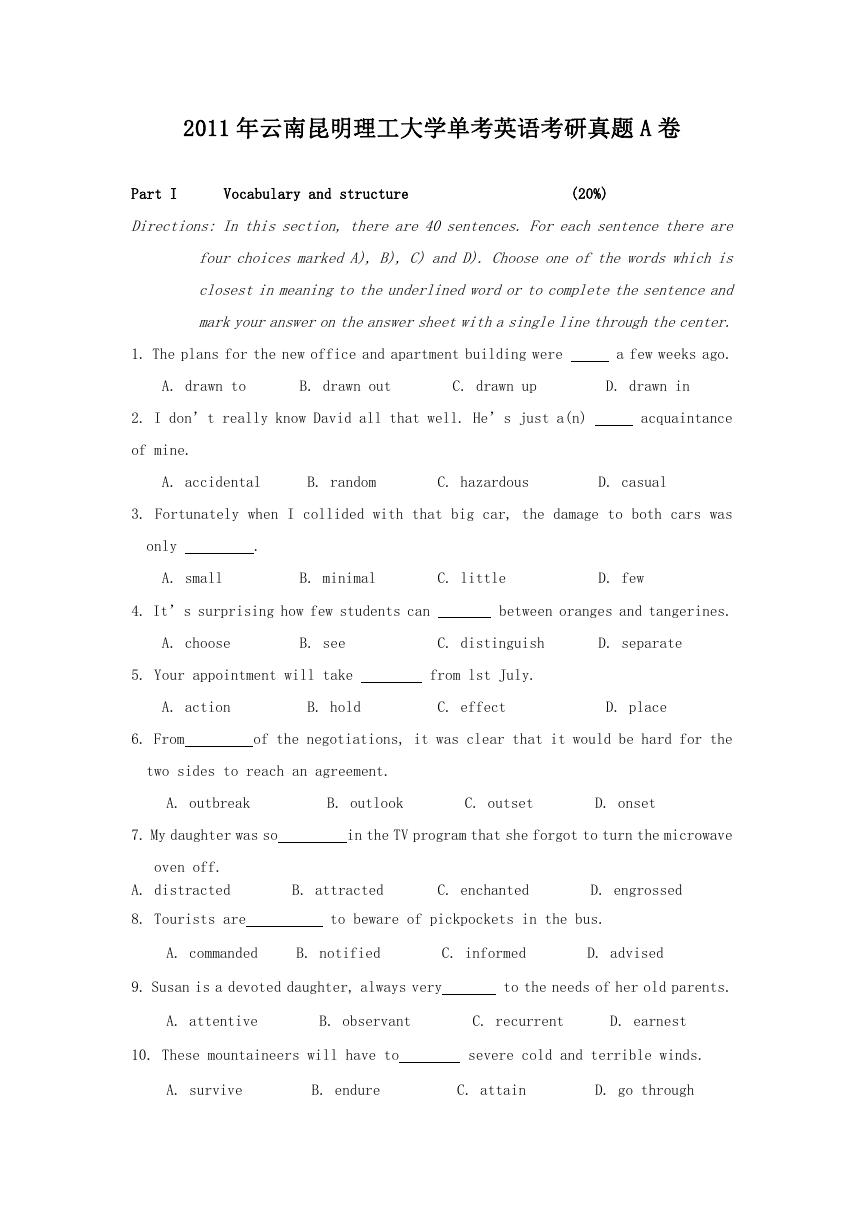

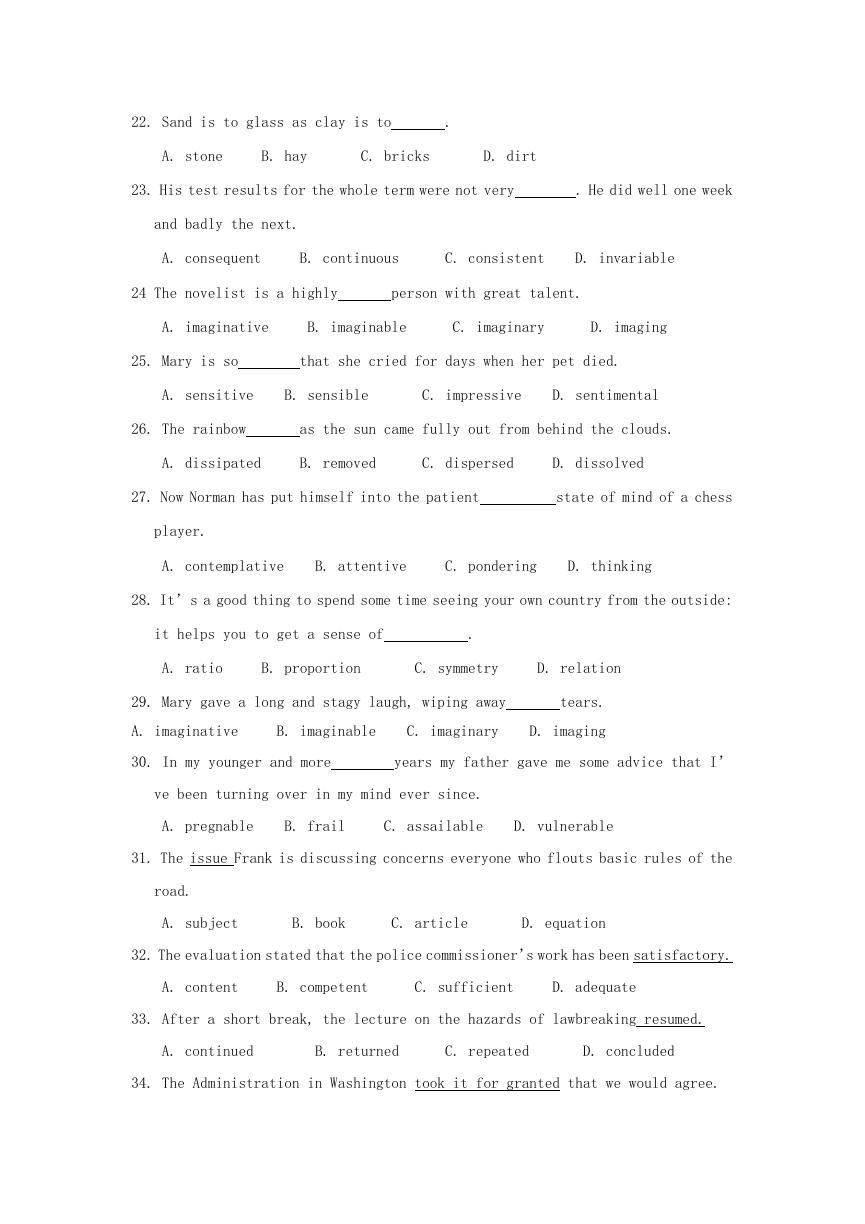
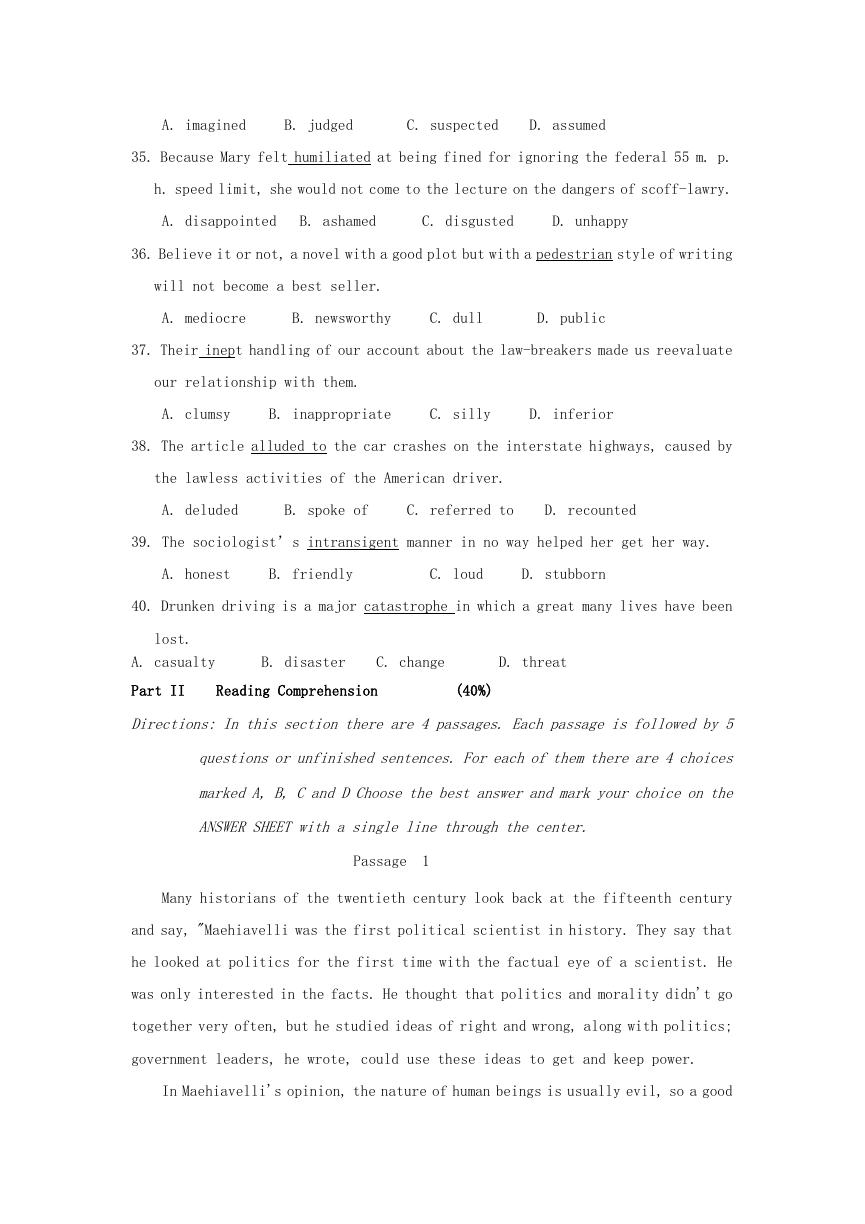
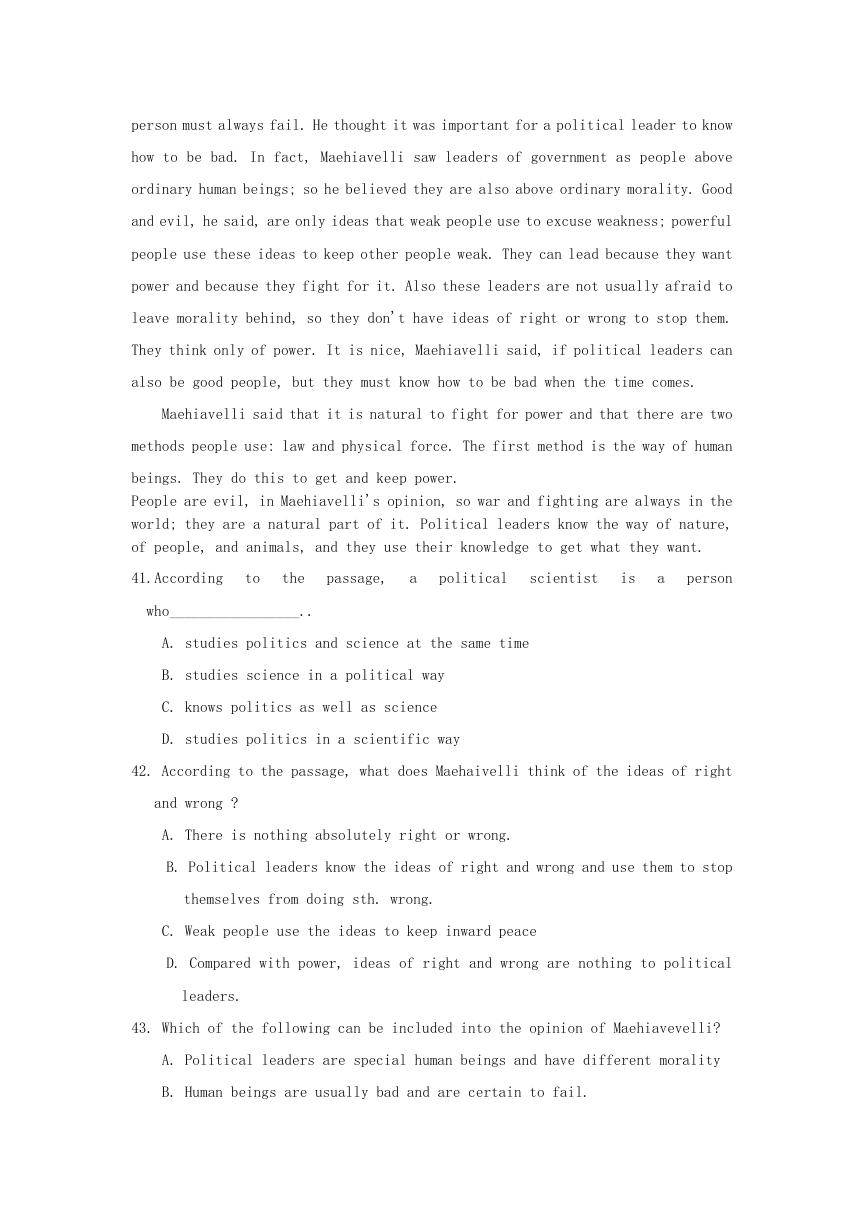
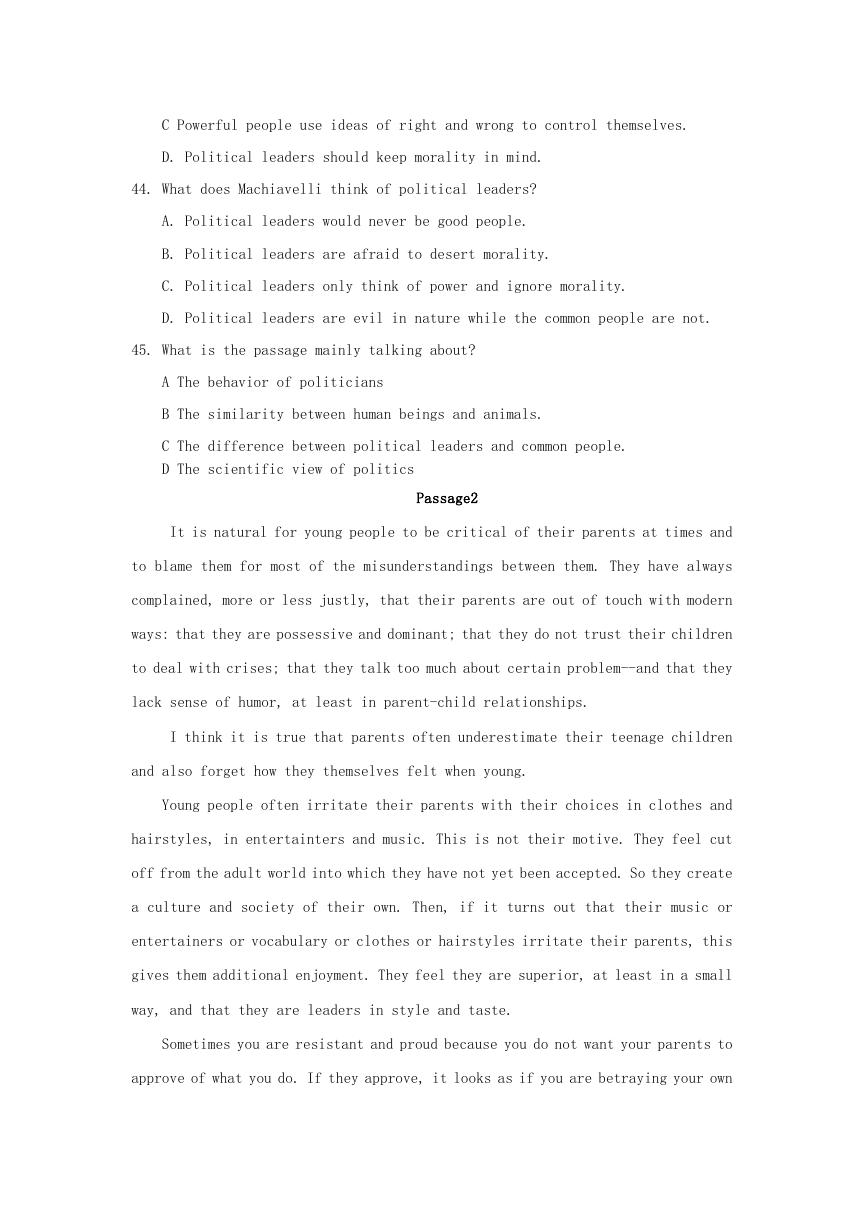
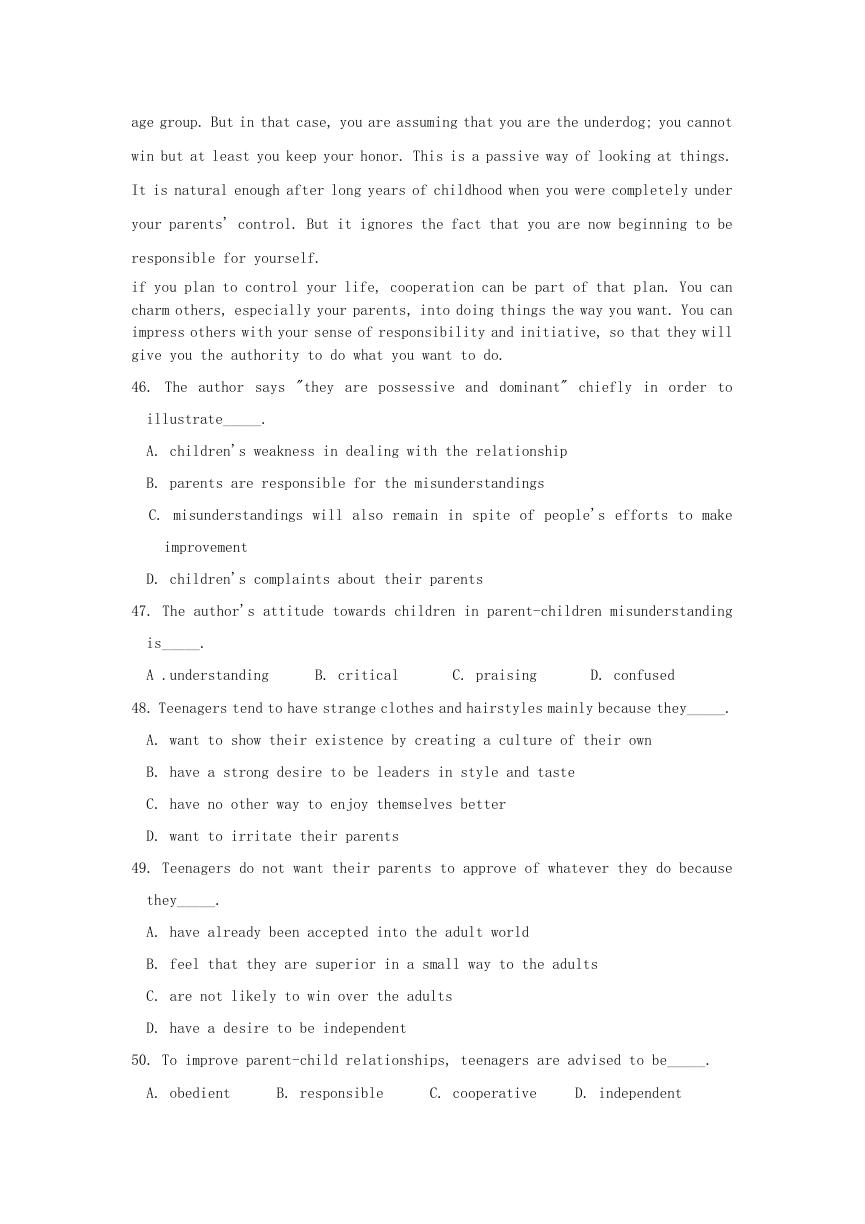
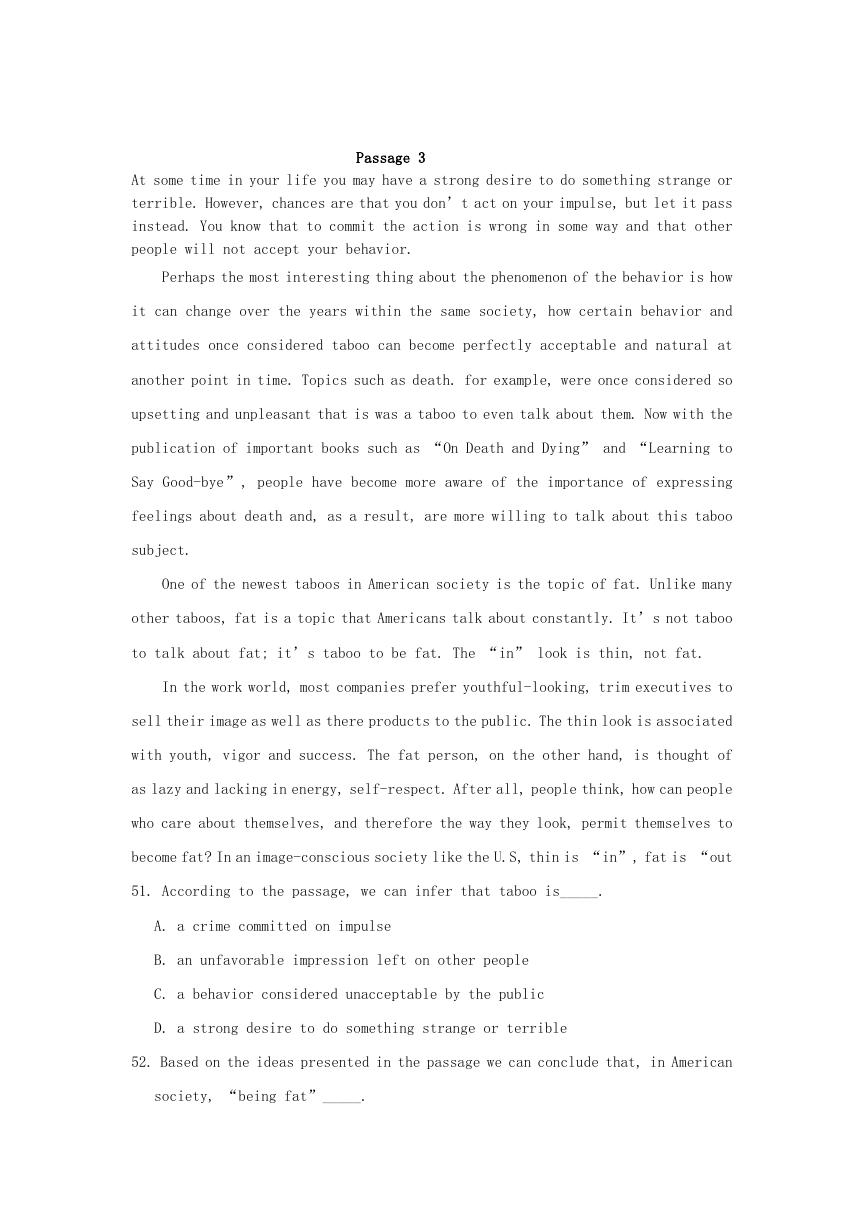








 2023年江西萍乡中考道德与法治真题及答案.doc
2023年江西萍乡中考道德与法治真题及答案.doc 2012年重庆南川中考生物真题及答案.doc
2012年重庆南川中考生物真题及答案.doc 2013年江西师范大学地理学综合及文艺理论基础考研真题.doc
2013年江西师范大学地理学综合及文艺理论基础考研真题.doc 2020年四川甘孜小升初语文真题及答案I卷.doc
2020年四川甘孜小升初语文真题及答案I卷.doc 2020年注册岩土工程师专业基础考试真题及答案.doc
2020年注册岩土工程师专业基础考试真题及答案.doc 2023-2024学年福建省厦门市九年级上学期数学月考试题及答案.doc
2023-2024学年福建省厦门市九年级上学期数学月考试题及答案.doc 2021-2022学年辽宁省沈阳市大东区九年级上学期语文期末试题及答案.doc
2021-2022学年辽宁省沈阳市大东区九年级上学期语文期末试题及答案.doc 2022-2023学年北京东城区初三第一学期物理期末试卷及答案.doc
2022-2023学年北京东城区初三第一学期物理期末试卷及答案.doc 2018上半年江西教师资格初中地理学科知识与教学能力真题及答案.doc
2018上半年江西教师资格初中地理学科知识与教学能力真题及答案.doc 2012年河北国家公务员申论考试真题及答案-省级.doc
2012年河北国家公务员申论考试真题及答案-省级.doc 2020-2021学年江苏省扬州市江都区邵樊片九年级上学期数学第一次质量检测试题及答案.doc
2020-2021学年江苏省扬州市江都区邵樊片九年级上学期数学第一次质量检测试题及答案.doc 2022下半年黑龙江教师资格证中学综合素质真题及答案.doc
2022下半年黑龙江教师资格证中学综合素质真题及答案.doc